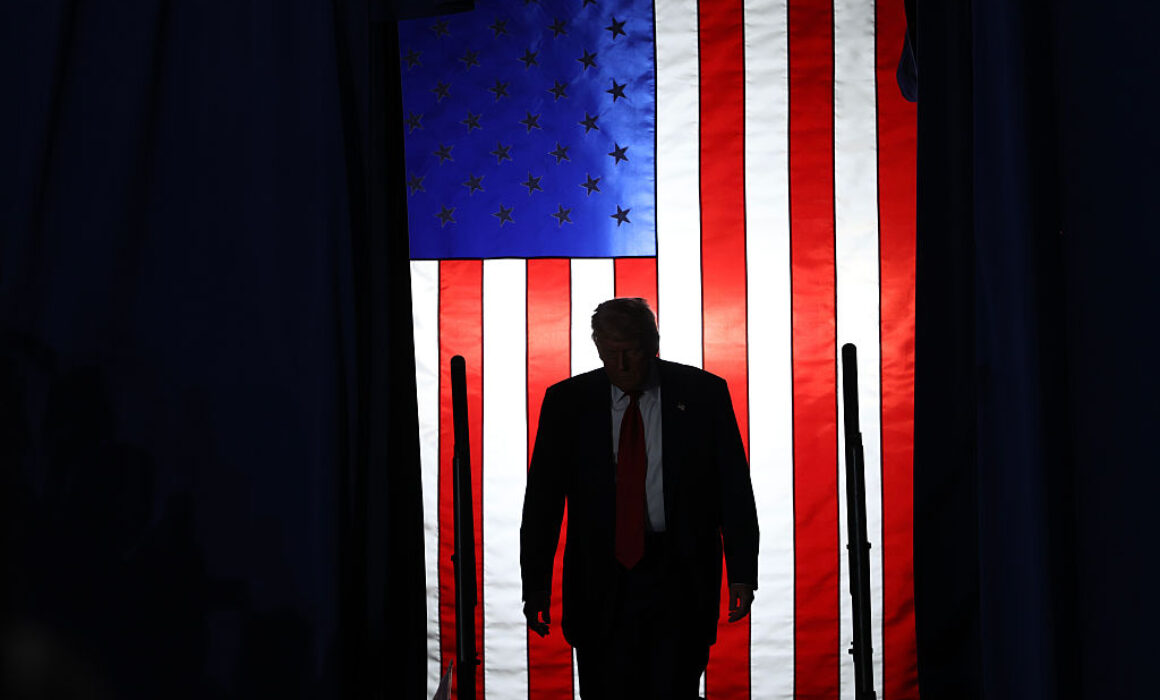What Comes After 100 Days of Chaos
May 2, 2025
And how we can restore stability and prosperity.
The Roosevelt Rundown features our top stories of the week.

(Scott Olson/Getty Images)
Better Visions for Our Democracy Exist
On Tuesday, the Trump administration marked 100 days in office, a framework first used by Franklin D. Roosevelt—who, similarly to Trump, came into power during a pivotal moment amid rising authoritarianism around the world. Both presidents made massive impacts on government and society in the opening chapters of their presidency.
But that’s where the comparison ends.
“One is choosing chaos, cruelty, and corruption. The other brought the competence to contain instability, answer the uncertainties of unchecked capitalism, and rein in grift,” Roosevelt President and CEO Elizabeth Wilkins writes. “One man is undermining democracy. The other sought to preserve it.”
Reflecting on the chaotic start of Trump’s second term, the Roosevelt Institute released a new essay collection that brings together 23 authors from different disciplinary backgrounds to analyze the challenges we face today and imagine new ideas that support the economic security, agency, and power of the people.
“If we believe in democracy because it allows us to shape the conditions of our lives,” journalist and Roosevelt Fellow Osita Nwanevu writes in an introductory essay, “we should carry democracy into our economic lives and our very workplaces.”
The collection features a variety of authors and perspectives on building an economy shaped by and for the many, including Sen. Chris Murphy on renewing local communities, Arindrajit Dube on achieving full employment, and Mariana Mazzucato on creating a mission-oriented industrial strategy.
At its core, the collection attempts to think as boldly as FDR did. As he said to Congress in 1937, “Ours was the task to prove that democracy could be made to function in the world of today . . .” And he did it, writes Wilkins, “not by explaining the merits of democracy but by showing that it was the best system of government to deliver shared growth, prosperity, and power for the American people.”
Climate Risk Is Tightening Credit Markets
Climate change—and the fires and floods that come with it—has made insurers consider some homes and infrastructure too financially risky to protect. This has downstream effects on credit markets, as lenders tighten loan standards and borrowers hesitate to invest.
In the latest edition of Fed Lit, Roosevelt’s Kristina Karlsson and Sarah Bloom Raskin review the findings of a study on the impact of climate risk on credit markets and overall financial stability—and urge the Fed to take these impacts seriously when collecting data and analyzing financial sector vulnerabilities.
What We’re Talking About
Apps can’t replace fair wages or safe conditions.
Comedian @alex_falcone emphasized a few urgent messages from our report about gig nursing platforms, offering a #MayDay reminder that workers deserve transparency, stability, and not to be exploited: https://t.co/wHEs4tl5Nh pic.twitter.com/Ks9L1QGVBY
— Roosevelt Institute (@rooseveltinst) May 1, 2025
What We’re Reading
- New York Times columnist Jamelle Bouie contrasted Trump’s first 100 days with FDR’s, which he calls “a legislative accomplishment as much as an executive one.” As opposed to Trump’s “autocratic means,” Bouie writes, “Roosevelt did not transform the United States with a series of executive orders; he did so with a series of laws.”
- Anna Eleanor Roosevelt, Roosevelt Institute Board Chair and granddaughter of Franklin and Eleanor Roosevelt, responded to Bouie’s column, adding that a president’s first 100 days should be judged by “the confidence in the American promise that it inspires, not the fear it sows.”
- And while Trump inherited a relatively strong macroeconomy, FDR was elected into an economic calamity. As Roosevelt Senior Fellow David Woolner told the Washington Post, “The country was in some places unrecognizable.”
- The Trump administration’s cuts to scientific research could slow down innovation and productivity, which could significantly shrink the US economy in the long run, according to a study from American University.
- The cuts also threaten vital information gathering—all 400 of the researchers who contribute to the National Climate Assessment, a comprehensive look at how climate change is impacting the country, were dismissed by the administration this week.
- The administration’s attacks on journalism continued with an executive order that seeks to end funding for NPR and PBS, even though the Corporation for Public Broadcasting, which funds both, is a private nonprofit entity authorized by Congress.
- In other media news, roughly half of Americans expect AI to have a negative effect on news over the next two decades, according to a Pew Research Center survey, and 66 percent of respondents were extremely or very concerned about AI disseminating inaccurate information.